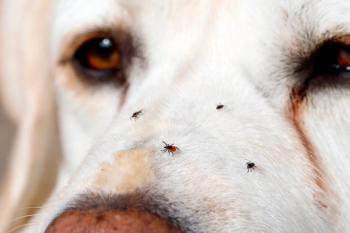
5 true bloodsuckers
Forget vampires. Meet five blood-sucking creatures-veterinary edition. From fleas to lice, be warned: They want to suck clients' and pets' blood!
Fleas
Getty Images
Fleas are formidable opponents. Their hard shells are nearly indestructible and they have a sneaky ability to evade detection. In fact, their near invisibility to their greatest weapon. Many of your veterinary clients don’t protect their pets against fleas because they don’t see them—until it’s too late. Help clients and pets live flea-free by talking to clients about the benefits of year-round parasite protection.
Ticks
Getty Images
Ticks can drink up to 600 times their body weight in blood due to their stretchable outer shell. But don’t let clients think that all ticks do is take, take, take. Ticks have the ability to give too. For example, ticks can spread Lyme disease. So the next time you’re talking to clients about pet parasite prevention, be sure to mention the risks of zoonoses.
Mosquitoes
Getty Images
Mosquitoes are behind more human deaths than any other animal, according to the
Bedbugs
Getty Images
While almost eradicated thanks to modern day pesticides, these nightwalkers continue to hide in mattresses, behind walls, and under floors during the day, waiting for dark to prey. While they aren’t known to spread diseases, clients may be concerned with their painful bites and lasting infections. Bed bugs will bite pets if that is their only option, but they tend to stick to humans when given the choice. Consider keeping literature on bedbug eradication or exterminators phone numbers at your hospital to give to alarmed clients. You could even create a client handout on how to avoid bringing bedbugs back to their house while traveling.
Lice
Getty Images
Clients may think lice only affects the scalps of school children, but that couldn’t be further from the truth. Besides attacking the head, body, and pubic areas in humans, lice also feed off animals. Talk to your clients about the best ways to avoid lice, which include regular bathing and clean clothes. You could even pose the idea of the practice carrying de-lousing products for clients to buy.
Newsletter
From exam room tips to practice management insights, get trusted veterinary news delivered straight to your inbox—subscribe to dvm360.






